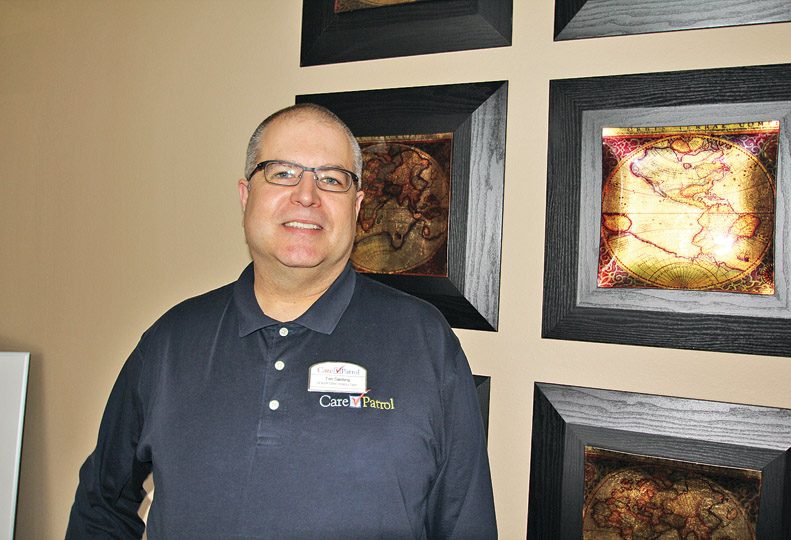
Home » Senior housing placement needs grow
Senior housing placement needs grow
CarePatrol office here matches clients with care environments

July 30, 2015
Tim Swilling sees no shortage in demand for matching seniors with appropriate housing and care services.
Swilling and his wife, Beth, own the Spokane-area CarePatrol franchise, a senior-living and care-finding consultant service.
Swilling says 10,000 Americans reach the age of 65 every day and that’s only going to double in the next 20 years.
“Either they or their parents will need some kind of care,” he says.
Swilling has been a senior care consultant since 2012, originally as the franchisee here for Assisted Transition until the parent company was bought by Gilbert Ariz.-based CarePatrol last year.
“In the past three years, we’ve helped over 300 families,” he says.
CarePatrol’s Spokane office is located at 319 W. Hastings Road. The franchise currently has one other employee and a marketing intern on staff, he says.
Often, CarePatrol is called on to help clients and their families when they’re challenged with a change in a senior’s care needs and don’t know what options are available or how to navigate through them.
“I like to go and meet the family and get my eyes on the candidate,” Swilling says.
He and Barbara Griffith, also a CarePatrol senior care consultant, assess clients to identify their needs and means.
By the time the initial assessment is complete, they usually have a short list of places in mind for the client to visit.
“I need a three-hour window of time to pick up the family and go to places I think might be a match,” he says. “If there’s a care environment that meets their needs and budget, we’ll find it—usually on the first try.”
CarePatrol follows up on placements for a month or longer to ensure the client is fitting in well.
Griffith says one recent client who was near death before placement in an adult family home is now gaining strength and walking.
“It makes you cry,” she says. “It’s an emotional paycheck.”
Swilling says CarePatrol doesn’t charge clients directly for its services.
“Services are free to the family and their loved ones,” he says. “We get paid upon placement if it’s private-pay.”
In such cases, CarePatrol charges the care facilities about 60 percent of the first month’s rate for rent and care.
While CarePatrol is a for-profit business, Swilling says he does a lot of pro bono work for Medicaid recipients because Medicaid prohibits placement fees.
“If I find out they are on Medicaid, I’m not looking for money,” Swilling says. “I walk them through the process as well. We’re not getting rich quick, but we can sleep very well.”
Medicaid is a federal and state-funded health care insurance program for low-income people.
For such clients, Swilling has compiled information on low-income housing and government and nonprofit services.
Despite pro bono work, CarePatrol’s revenue is stable and growing, he says.
“My business is growing through word of mouth,” he says. “I get referrals from places that can’t take any more clients.”
CarePatrol also receives referrals from elder services, social workers, and occasionally hospital emergency departments.
“We’re busy. The need never stops,” Swilling says. “We don’t mind touring on Saturdays and Sundays.”
Swilling says he’s learned the pros and cons of various living and care options and locations, including independent living, assisted living, adult family living, memory care, skilled nursing, and one-on-one care.
The range of choices can be overwhelming for clients and their families. For instance, he says, there are 175 adult family homes licensed in the greater Spokane area, and CarePatrol is familiar with most of them.
Swilling says he most often recommends adult family homes rather than skilled nursing facilities for people needing higher levels of care than are readily available in larger independent-living or assisted-living environments.
“I personally think that adult family homes have a better care paradigm,” he says.
An adult family home typically has a maximum of six residents, meaning there is at least one caregiver to six residents. At skilled nursing facilities, caregivers can have more than twice as many residents to care for, he asserts.
Full-time skilled nursing easily can cost twice as much as adult family care, Swilling adds.
Adult family care costs typically range from $3,500 to $6,000 a month, while 24-hour skilled nursing care can cost $8,000 to $12,000 a month, he says.
Many assisted-living centers and adult family homes accept Medicaid after a resident has lived there two or three years, should clients deplete their assets, he says.
Swilling says he found his calling in senior-placement services after a 25-year career in the information-technology field.
“My wife and I worked for the same company and got laid off on the same day,” he says. “I decided I’m not going to put my faith in someone’s hands anymore. This business spoke to me, and I get validation every day.”
Griffith, who has a background in nutrition and dietetics, has been a senior care consultant at CarePatrol for about a year.
“I volunteered and then fell in love with it,” she says. “The biggest thing for me is the difference you make in people’s lives.”
CarePatrol has 137 franchises in 36 states.
The Spokane franchise covers all of Spokane County. Swilling says he’s traveled as far as Colville and Moses Lake in Eastern Washington and Coeur d’Alene and Sandpoint in North Idaho to meet with clients or their families.
CarePatrol was founded by former social workers in 1993, and social-services priorities are ingrained in the corporate philosophy. “If you call the company, the first voice you hear is a social worker,” he says. “They are going to already be familiar with issues seniors or their family members are going through.”
Latest News Special Report Real Estate & Construction
Related Articles


![Brad head shot[1] web](https://www.spokanejournal.com/ext/resources/2025/03/10/thumb/Brad-Head-Shot[1]_web.jpg?1741642753)

